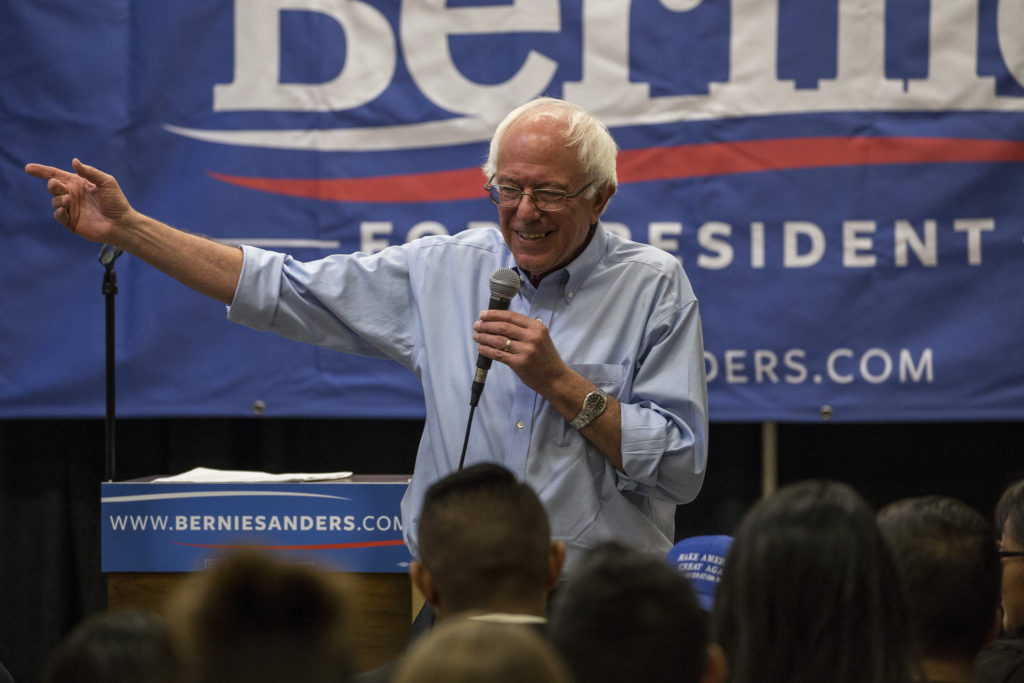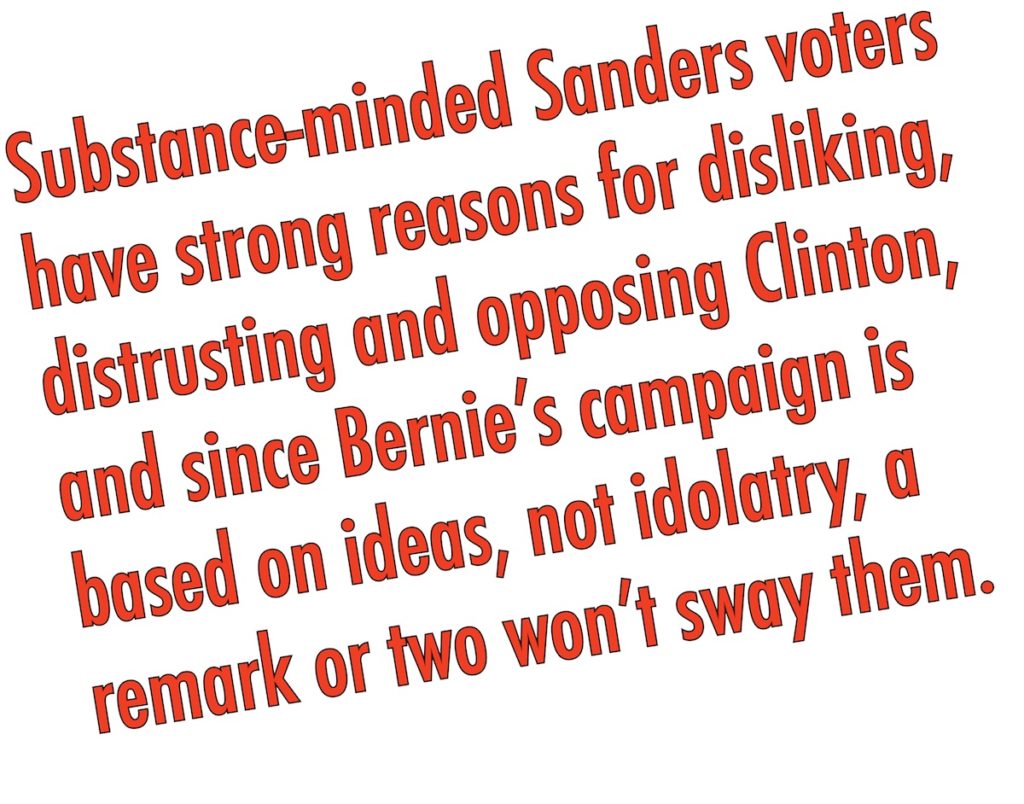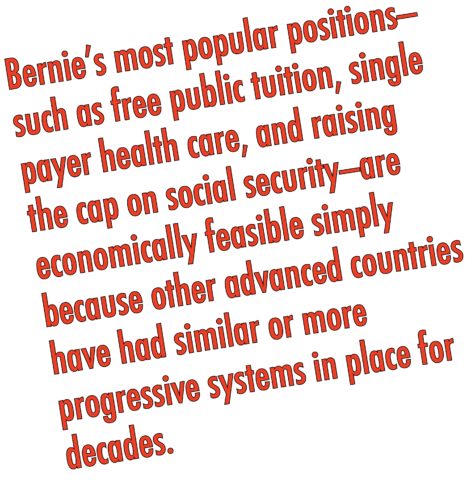Hillary Clinton’s supporters’ argument that Bernie Sanders backers should throw their support to her in November relies on two main points: mainly, that the party must unite to defeat Donald Trump; but also, that Sanders has already pushed Hillary to the left, and hence 2016 Hillary is much more palatable to left-liberals than her earlier incarnations.

On some issues, this might be true. Hillary now claims to support raising the minimum wage to $12 an hour, expanding the Social Security Trust Fund, and inaugurating a work-study program to eliminate college debt.
Still, Hillary’s stances on several key issues remain unclear, and if she wishes to sway Bernie voters to her side, she should answer the following questions:
1) Is Hillary for or against “capital f” Free Trade?
A cynic might claim that Hillary opposes Free Trade Agreements (FTAs) while running for office, but supports them while in office. Or, perhaps she opposes them generally, but favors them in every specific case—since every new FTA, unlike the previous, includes provisions that will protect labor rights and the environment.
As a candidate in 2008, Hillary opposed the Panama, Colombia, and South Korea FTAs, and promised to renegotiate NAFTA. As Obama’s Secretary of State, she vigorously supported all of these agreements and did nothing to alter NAFTA. In so doing, she stood far to the right of House Democrats (84%, 67%, and 65% voted against the Colombia, Korea, and Panama deals, respectively). She also heaped praise upon the TPP, calling it the “gold standard” of FTAs. She now opposes it, and would adduce this flip-flop and her only other opposition to an FTA (the Central American Free Trade Agreement, or CAFTA) as evidence that she has always staunchly opposed them.
Debating in Michigan, Hillary stated, “I voted against the only multinational trade agreement that came before me when I was in the Senate. It was called CAFTA.” This is true only in the most gymnastically semantic sense. Yes, technically, the Central American Free Trade Agreement was the only “multinational” FTA that Clinton voted on as a senator (she joined 77% of Senate Democrats in opposing it) if “multi-national” is defined as involving three or more countries, rather than two. But as senator, she supported “bi-national” FTAs with all of the following countries: Oman, Morocco, Australia, Singapore, and Chile.

Her world-class prevarications notwithstanding, Hillary must do two simple things to impress Bernie voters: 1) Defend or repudiate her record or overwhelming support for FTAs, and 2) “Set the record straight” that she will unconditionally oppose similar FTAs as president.
2) How big is too big to fail?
Hillary persistently argues that no bank should be too big to fail, that her banking regulation scheme is more progressive than Bernie’s, and that Dodd-Frank alone empowers her to break up the big banks. But unlike Bernie, who would break banks up straightaway, Hillary will break them up “if the circumstances warrant it.” But given that the banks are larger today than they were before the 2008 crash, Hillary must answer what constitutes “too big to fail.” Are the banks not too large already? Were they not too large in 2008? Hillary must answer “yes,” and promise to break them up straightaway (which she alone thinks will be easy to do with the super-awesome, not at all impotent, Dodd-Frank legislation), or convincingly make the unpopular argument that they are not yet too big.
3) Why is a new Glass-Steagall “unnecessary?”
The Glass-Steagall Act, which separated commercial and investment banking, was repealed by President Bill Clinton during the 1990s. Nearly all progressives who wish to vigorously regulate Wall Street, from Elizabeth Warren and Bernie to top economists to the progressive base, have demanded a “21st Century Glass-Steagall” ever since the 2008 crash. Hillary consistently claims that her financial regulation scheme is more progressive than Bernie’s, and yet she won’t explain why she thinks that enacting a new Glass-Steagall is unnecessary. If her claim to be progressive on financial regulation is to be taken seriously, Hillary must be transparent about why she opposes a new Glass-Steagall.
4) How will the Affordable Care Act be expanded to cover 100% of all Americans?
Hillary has claimed that she will expand Obama’s Affordable Care Act to cover 100% of Americans. But those who have observed Republican obstructionism and Obama’s own stripping the ACA of some of its provisions, such as the Cadillac Tax, would be foolish to believe her—especially given that she has promised (without any pressure from Grover Norquist) to never raise middle class taxes, even if doing so would guarantee free public health care for all. Thanks to pressure from Sanders’ candidacy, Hillary has re-embraced the public option, but the chances that Republican governors will enact it is nil, given their heartless opposition to the ACA’s Medicaid expansion. And since 30 million Americans remain uninsured, her promise to cover everyone with Republican support amounts to hand-waving; and worse, this obvious falsehood flatly contradicts her notion that she knows how to work with Republicans.
Far from working to ensure 100% coverage, Hillary is using her rhetorical talents to prevent 100% coverage from being enacted in the foreseeable future.
5) When may Democratic leaders discuss single-payer again?
I claim above that since Hillary opposes a single-payer plan in principle (because it would raise middle-class taxes), and in practice (because its appeal would magically compel a Democratic president to unilaterally dismantle Obamacare), Hillary’s election would guarantee that single-payer will not be seriously discussed until at least 2024. If this is not the case, Hillary must explain why and when she will cease actively working against top Democrats on this issue. If Hillary wants to be less hated (let alone supported) by progressives, she should cease denouncing Sanders—and by extension all single-payer advocates—for merely raising this top progressive issue.
6) Will Hillary disempower teachers’ unions, as she seemed to promise in Michigan?
From the hundreds of school closings that have occurred in our major cities, to Bush’s No Child Left Behind, to Obama’s Race To the Top, to Scott Walker’s killing collective bargaining, to Indiana’s and Michigan’s becoming “right-to-work states,” the past fifteen years have been murder for teachers. Thanks to the two major teacher’s unions’ (NEA and AFT) endorsing Hillary gratis and undemocratically, Hillary has gotten away with praising teachers, while suggesting, through omission, that she would continue Obama’s legacy of destroying their power and dignity—since she consistently praises Obama and his policies. To woo teachers and labor supporters, Hillary must acknowledge that Obama’s education policies are anti-progressive, and she must signal where and how she will change course.
7) How can Hillary value the “intended consequences” of the Crime Bill and still claim to have turned left on criminal justice?
The U.S. has the highest per capita prison population on the planet, and Bill Clinton’s 1994 Crime Bill—which mandated the “three strike rule,” whereby thrice convicted felons may receive life sentences for relatively minor offenses—played a significant role in this. For her part, Hillary vigorously supported the Crime Bill, and has been harshly criticized for her hard-line record on criminal justice issues and her troubling rhetoric, including labeling child gang members as “super-predators.” In the Brooklyn debate, when Hillary was asked whether she regretted supporting the Crime Bill, she apologized for “the consequences that were unintended,” which implies that she favors the intended consequences.
Regardless, Hillary implied that she continues to support the “three strikes rule,” as well as every draconian provision in the bill. Meanwhile, our prisons remain full, even though our violent crime rate has been cut in half since the 1980s, and 95% of prisoners have never even gone to trial in a system that is so merciless that innocents often falsely plead guilty to crimes for fear of wrongful conviction. The questions, here, are simple: Does Hillary really wish to defend “the intended consequences” of the most infamous criminal justice bill that she ever supported? Or, will she attempt to reform it, or scrap it altogether as president? Bernie voters, and the millions who are languishing in our inhumane system, deserve an answer.
8) Is the U.S. governed by international law?
Despite her experience as a lawyer and legislator, Hillary rarely uses legal sophistry to defend some of the U.S.’s apparent violations of international law: I refer to her support for Israel’s 50-year occupation of Palestine, as well as its 2014 invasion of Gaza, her effective green-lighting of the goals of the 2009 coup government in Honduras, her deporting Central American refugees who are likely protected by U.S. and international law, her retention of Madeline Albright who implemented the ’90s-era sanctions against Iraq (which killed half a million people according to UN estimates) as a top campaign surrogate, and her support for the the Iraq War. There is an international consensus (perhaps not in the U.S.) that most if not all of these actions were not just immoral but illegal. Hillary needs to answer: A) Does international law matter at all? B) Is the U.S. subject to it? and C) What will she do as president to ensure that the U.S. does not act criminally?
9) Why will Hillary “get things done” if Obama has not?
Hillary has advertised herself as the ideological successor to Barack Obama, and implied that she will achieve more progressive goals in part because she is not so far left as Sanders. But the notion that Obama has had many progressive accomplishments is a joke-and-a-half to anyone who has been paying attention. Recall that after promising a $9.50 minimum wage during the 2008 campaign, he unilaterally disarmed on the issue, not even mentioning it until 2013, when he proposed a hike to $9 per hour. Recall that during his first term, he gave up on ending the Bush tax cuts, chose to freeze federal employees’ salaries, reneged on his opposition to trade deals (Colombia, Korea, and NAFTA), excluded the public health care option from consideration, tripled the number of troops in Afghanistan, tried to extend the U.S.’s commitment in Iraq, promoted cutting regulations during State of the Union addresses, and even enforced the Defense of Marriage Act during his first term.
Worse, there are other areas where Obama has always been non-hypocritically right-wing; namely through his drone wars in eight countries, his Constitution-shattering data collection program, his record-setting use of the Espionage Act, his record-setting deportations, and his assassination program, which asserts the ability to assassinate Americans as enemy combatants in the War On Terror.
Hillary routinely criticizes Bernie for vowing to improve on Dodd-Frank by enacting Glass-Steagall, and vowing to replace Obamacare with single-payer. In so doing, she shamelessly conflates policy prescriptions with personal feelings (as in don’t insult Obama by improving upon his work), and marks herself as perhaps the only Democrat in the country who views Obama’s major victories, not as flawed advances, but as unqualified successes. And the idea that Obama acted as progressively as possible when armed with the largest legislative majorities (during 2009-2011) since the Johnson administration, doesn’t merely strain credulity; it insults intelligence. Hillary has succeeded in pandering to the low-information voters and willfully ignorant pundits who have defended Obama’s every sellout, compromise, abuse, and crime. But Bernie’s candidacy flourishes because millions of progressives know that Obama did a woefully inadequate job.
If Hillary wants their support, she must make a counter-intuitive leftward post-primary pivot, and instead of selling meager Obama policies as being potent “because Obama,” she will have to acknowledge where Obama failed, and explain how she will chart a more progressive (and more humane) course.

10) Are Bernie’s popular positions economically or politically “impractical?”
To Bernie supporters, Bernie’s most popular positions—such as free public tuition, single payer health care, and raising the cap on social security—are economically feasible simply because other advanced countries (many of which are poorer than the U.S.) have had similar or more progressive systems in place for decades.
For her part, Hillary usually gives a trinity of reasons to oppose Sanders’s bread-and-butter, re-enter-the-first-world policies: a politically practical reason, an economically practical reason, and a moral reason. On free tuition, Hillary says it’s too expensive, Republicans won’t support it, and it’s immoral because Donald Trump’s children might benefit from it. On single-payer health care, not only would Republicans not support it, but its mere discussion would also magically empower them to force Hillary to sign legislation to dismantle Obamacare (damn their Jedi mind tricks). And it is morally wrong because it would slightly increase taxes for middle class Americans, most of whom would save thousands more on health care. The lady and Mr. Krugman doth protest too much, methinks, and their palette of reasons, which range from right-wing to trivial, to nonsensical, to somewhat substantial, betray the larger context: Americans overwhelmingly desire to reclaim their place amidst advanced nations, and there are no good arguments for why so many of us should languish in poverty, debt, and insecurity.
Thus, in an attempt to muddy the waters, Hillary has muddied the focus of her left-of-Hillaries-past campaign. Old habits die hard, and thus Hillary has enlisted the arguments of extreme right-wing economist Gary Becker (who argues that the many shouldn’t pay the wealthy’s tuition), and Grover Norquist (who says don’t raise taxes, ever, because you’re a Republican) to attack Bernie with anything that will stick. Hillary must either accept the bread-and-butter progressive planks of Bernie’s platform (i.e. promising to work for single-payer, free tuition, and lifting the cap on social security), or provide an honest and plausible reason to oppose them—free of right-wing nonsense.
11) Should the 2020 Democratic nominating process be democracy-free?
Those progressives who would support Jill Stein (Green Party) or no one over Hillary in November actually have one strong reason to prefer a Trump presidency to a Hillary presidency: If Hillary wins in 2016, she will almost definitely be re-nominated in 2020, whereas if Trump wins, progressives can try to nominate whomever they want in 2020, including Bernie, Elizabeth Warren, and Russ Feingold (arguably the three most electable progressives since FDR)—all of whom might be too old when 2024 rolls around. Thus, if Hillary wants Bernie voters’ support, she must be unequivocally clear that she will tolerate and debate with any major Democrat who wishes to run against her in 2020.
Why demand that Hillary do what no other first-term president has ever done, and invite Democratic challengers in 2020? Isn’t it a bit sexist and even Limbaugh-esque to set such high and unique standards for Hillary? Not in this case—since Hillary has extraordinarily asserted that challenges to incumbent Democrats are immoral. In the Milwaukee debate, she criticized Bernie for arguing that Obama “should have a primary opponent” in 2012—as if criticized presidents should be able to count on democracy-free, unchallenged paths to their party’s nomination; as if challenges from the left and more accountability from the base would necessarily weaken a party. Hillary has thus marked herself as the staunchest party apparatchik, no better than Debbie Wasserman-Schultz. She must either retract her anti-primary notion or provide a vigorous and convincing case—against democracy.
It should be noted that Bernie Sanders is not categorically better than Hillary Clinton on every issue. His criminal justice policies are, arguably, just as thin—as he condenses the myriad problems of the carceral state into a criticism against penalties for marijuana possession. And thanks, in part, to the paucity of debates, his views on education, like Hillary’s, are not fully formed or scrutinized (although his advocacy of striking Verizon workers makes him more reliable to any unionized profession than Hillary, a former Wal-Mart board member).
But the common thread is that Hillary wants to have her cake and eat it too. Like Obama, she wants to start cede fifty yards of ground and negotiate from the center on such issues as health care, banking regulation, and social security. Worse, she stultifies every debate with the most disingenuous, ridiculous and intelligence-insulting obfuscations; namely, that she always rhetorically opposed “multinational free trade”; that Dodd-Frank is potent; and that she will break up the banks just in time to prevent a crash, if they’ll only grow twice their current size first. She thus does much damage to the progressive cause, yet assumes that Bernie voters will support her because of party loyalty.
As Bernie Sanders says, he can’t wave a magic wand and compel his supporters to support Hillary. Substance-minded Sanders voters have strong reasons for disliking, distrusting and opposing her, and since Bernie’s campaign is based on ideas, not idolatry, a remark or two won’t sway them. And if they are smart, Bernie voters will loudly voice that their support is conditional on Hillary’s embracing some of Bernie’s policies and answering some simple questions.

The Sanders/Clinton rift is old news and both of them are aging out in their quest to become President. The question we should be asking very soon is who is the best Democratic Candidate that can both represent the party and beat Trump in the 2020 election.